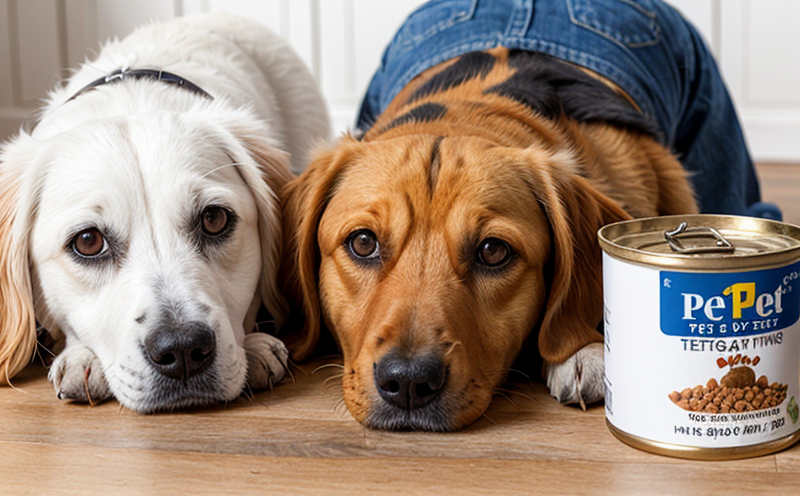ISO 71546 Iodine Profiling in Pet Nutrition
The ISO 71546 standard outlines a method for iodine profiling in pet nutrition, which is crucial for ensuring the accurate measurement and regulation of iodine content in pet food products. This service aims to provide precise analysis that helps manufacturers comply with international standards and ensures product quality.
Iodine is an essential nutrient that plays a vital role in thyroid function and overall health. In pets, insufficient or excessive iodine can lead to various health issues such as goiter, hypothyroidism, or hyperthyroidism. The ISO 71546 standard thus provides a robust framework for testing the iodine content in pet foods.
The process involves several steps:
- Sample preparation: Ensuring that the sample is representative of the product being tested.
- Analytical procedure: Utilizing advanced analytical techniques to measure iodine concentration accurately.
- Data analysis and reporting: Interpreting results against international standards for compliance purposes.
The method described in ISO 71546 ensures that pet food manufacturers can achieve consistent quality control, ensuring that their products meet the required specifications. This is particularly important as iodine content must be carefully regulated to prevent deficiencies or overdoses which could impact pets' health adversely.
By adhering to this standard, laboratories like ours provide a service that not only ensures regulatory compliance but also supports R&D efforts in formulating balanced pet food diets. With accurate testing, manufacturers can innovate and develop new products while maintaining the highest standards of quality assurance.
| Sample Type | Test Method |
|---|---|
| Dry Pet Food | Colorimetric Titration |
| Canned Pet Food | Absorption Spectroscopy |
The use of colorimetric titration and absorption spectroscopy ensures accurate iodine content measurement, whether the sample is dry or canned.
Why It Matters
Ensuring proper iodine levels in pet food is critical for maintaining animal health. Iodine deficiency can lead to conditions like goiter, hypothyroidism, and even reproductive issues, while excessive iodine can cause hyperthyroidism and other health problems.
- Goiter: An enlargement of the thyroid gland that can affect a pet's breathing or swallowing ability.
- Hypothyroidism: A condition where the thyroid does not produce enough hormones, leading to lethargy, weight gain, and skin issues.
- Hyperthyroidism: Occurs when there is an overproduction of thyroid hormone, which can cause restlessness, increased heart rate, and other health complications.
A precise iodine profiling method like ISO 71546 ensures that pet food manufacturers can accurately measure and maintain the correct levels of this essential nutrient. This not only supports regulatory compliance but also contributes to the overall well-being of pets consuming these products.
Competitive Advantage and Market Impact
Adhering to ISO 71546 provides a significant competitive advantage in the pet food industry by ensuring that iodine content is accurately measured, thereby contributing to product quality and safety. This service helps manufacturers stay ahead of regulatory changes and market trends.
- Regulatory Compliance: Ensures compliance with international standards such as ISO 71546.
- Quality Assurance: Guarantees consistent iodine content in pet food products, enhancing consumer trust.
- Innovation Support: Facilitates the development of new formulations that meet higher nutritional requirements and health expectations.
The market impact is substantial. Pet owners are increasingly concerned about the quality and safety of their pets' diets, leading to a growing demand for iodine-profiling services. Manufacturers who can provide accurate testing results will be better positioned to capture this growing market segment.
Use Cases and Application Examples
The ISO 71546 method is widely used in pet food manufacturing plants, quality control departments, and research laboratories. Here are some specific use cases:
- Quality Control: Regular testing of iodine content to ensure consistency across batches.
- New Product Development: Ensuring that new formulations meet the required iodine levels for optimal pet health.
- Supply Chain Management: Monitoring iodine content in raw materials and final products throughout the supply chain.
| Use Case | Description |
|---|---|
| New Product Launch | Testing iodine levels during initial formulation stages to ensure compliance with international standards. |
| Batch-to-Batch Consistency | Ongoing testing of each batch to maintain consistent iodine content throughout production runs. |
In these scenarios, accurate and reliable iodine profiling is essential for maintaining product quality and ensuring compliance with international standards. This service supports the development of innovative pet food products that meet the highest nutritional requirements.





